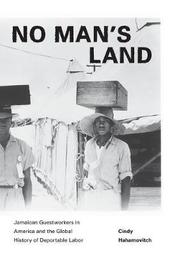
|
No Man's Land: Jamaican Guestworkers in America and the Global History of Deportable Labor
Paperback / softback
Main Details
| Title |
No Man's Land: Jamaican Guestworkers in America and the Global History of Deportable Labor
|
| Authors and Contributors |
By (author) Cindy Hahamovitch
|
| Series | Politics and Society in Modern America |
|---|
| Physical Properties |
| Format:Paperback / softback | | Pages:352 | | Dimensions(mm): Height 235,Width 152 |
|
| ISBN/Barcode |
9780691160153
|
| Classifications | Dewey:973.920049607292 |
|---|
| Audience | | Tertiary Education (US: College) | | Professional & Vocational | |
|---|
| Illustrations |
2 Maps
|
|
Publishing Details |
| Publisher |
Princeton University Press
|
| Imprint |
Princeton University Press
|
| Publication Date |
17 November 2013 |
| Publication Country |
United States
|
Description
From South Africa in the nineteenth century to Hong Kong today, nations around the world, including the United States, have turned to guestworker programs to manage migration. These temporary labor recruitment systems represented a state-brokered compromise between employers who wanted foreign workers and those who feared rising numbers of immigrants. Unlike immigrants, guestworkers couldn't settle, bring their families, or become citizens, and they had few rights. Indeed, instead of creating a manageable form of migration, guestworker programs created an especially vulnerable class of labor. Based on a vast array of sources from U.S., Jamaican, and English archives, as well as interviews, No Man's Land tells the history of the American "H2" program, the world's second oldest guestworker program. Since World War II, the H2 program has brought hundreds of thousands of mostly Jamaican men to the United States to do some of the nation's dirtiest and most dangerous farmwork for some of its biggest and most powerful agricultural corporations, companies that had the power to import and deport workers from abroad. Jamaican guestworkers occupied a no man's land between nations, protected neither by their home government nor by the United States. The workers complained, went on strike, and sued their employers in class action lawsuits, but their protests had little impact because they could be repatriated and replaced in a matter of hours. No Man's Land puts Jamaican guestworkers' experiences in the context of the global history of this fast-growing and perilous form of labor migration.
Author Biography
Cindy Hahamovitch is the Class of 38 Professor of History at the College of William & Mary. She is a Fulbright Fellow and the author of "The Fruits of Their Labor: Atlantic Coast Farmworkers and the Making of Migrant Poverty, 1870-1945".
ReviewsWinner of the 2012 Merle Curti Award, Organization of American Historians Winner of the 2012 James A. Rawley Prize, Organization of American Historians Winner of the 2012 Philip Taft Labor History Award, Cornell University School of Industrial and Labor Relations One of Choice's Outstanding Academic Titles for 2012 "No Man's Land is a fascinating, engaging study of one of the less-known guest worker programs in the U.S., the temporary recruitment of Jamaican nationals to work in the agriculture industry. Basing her work on a wide range of primary documents and oral interviews, the author illustrates the harsh and vulnerable working and living conditions guest workers experienced as they toiled in the fields of the Northeast, the South, and Florida... Overall, this is a fantastic book that gives a clear understanding of how Jamaican guest workers labored, lived, and struggled in the U.S.; the political and economic debates behind the rise and fall of temporary work programs; and the similarities and differences with other guest worker programs throughout the world."--Choice "Hahamovitch weaves together an illuminating account of history that explores how greed, racial tensions, political persuasion, and lots and lots of money created and preserved the American guestworker program."--Jihan A. Kahssay, European Legacy "Cindy Hahamovitch's award-winning book ... deserves the widespread praise that it has received. In this well-written, carefully crafted, and compelling book, Hahamovitch provides a fascinating account of the experiences of Jamaican guestworkers and the H2 Program that brought them to the United States... Hahamovitch's work is filled with original insights and compelling arguments that should be of use to anyone who is interested in race relations, global capitalism, and justice. Perhaps most important, Hahamovitch documents and explains how the rise of guestworker programs is usually accompanied by an equally significant rise in undocumented immigration."--Kathleen Mapes, Journal Of Southern History
|